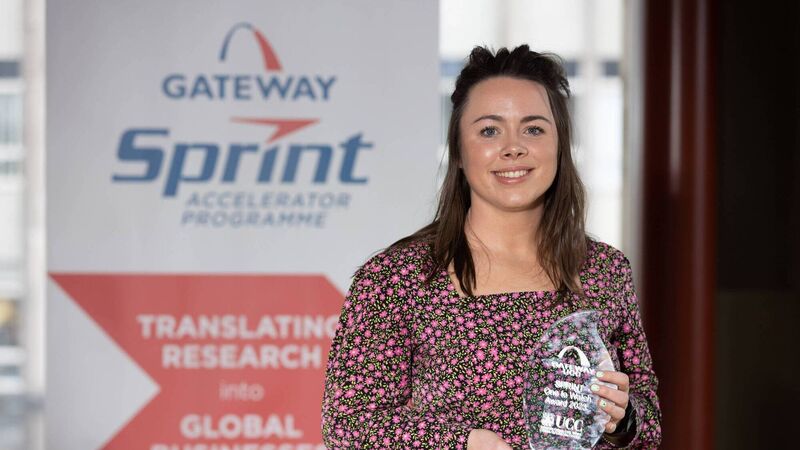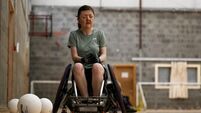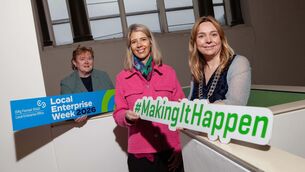Unlocking the potential of our skin’s bacteria to help treat skin conditions

Winner of the One To Watch Award , Dr Julie O Sullivan, APC Microbiome Ireland, at the 7th UCC Sprint Awards. Picture: Darragh Kane
THEY say that beauty is only skin deep, but our skin does a lot more than just keep us beautiful.
According to Dr Julie O’Sullivan, who is the second woman to chat to me about winning a recent Sprint ‘One To Watch’ award in UCC, our skin is our first line of defence against infection. It protects us in ways we often don’t realise.
Too often, she suggests, we end up focusing on beauty, forgetting the incredible science of skin.
Before meeting Julie, I certainly had no idea that bacteriocins, naturally occurring on our skin, act like protein missiles to kill off bad bacteria. And how the diversity and balance of bacteria is key in maintaining our overall health.
“No matter how clean and shiny we are, our skin is covered in bacteria, viruses and fungi. They work in synergy together and we need them for our health and survival.”
Julie’s work in the microbiology of skin promises to be a game- changer as it holds the power to release us from an over-reliance on antibiotics.
Antimicrobial resistance to antibiotics, she explains, is a major threat and so we need novel treatments. Our over-reliance is a deep concern. Sepsis, which is a result of our resistance to antibiotics, is now a bigger killer than cancer.
According to the World Health Organisation, by 2050 our antimicrobial resistance will be responsible for 10 million deaths a year. I fear we’ll reach that number before that.
Antimicrobial-producing bacteria found on our skin, according to O’Sullivan, could help in alleviating this problem.
Sprint Ambition
The Sprint award is about making a business out of academic research and O’Sullivan’s SkinCoat looks to have a promising business idea. Indeed, market interest has been confirmed by speaking with some of the largest cosmetic companies in the world.
Julie is effusive about the Sprint programme, run by Myriam Cronin in UCC.
“I studied business for my Junior Cert but did nothing in that area since. This programme really brought me from the lab bench to the board room.”
The product: SkinCoat
O’Sullivan is already well on her way to changing how we treat skin conditions like eczema and acne. She was recently awarded a feasibility study grant from Enterprise Ireland for her business idea of SkinCoat and is working with UCC Innovation to apply for a Commercialisation fund grant this July.
“Our team is developing a topical skin treatment for mild to moderate inflammatory flare ups caused by common bacteria.
“We have identified antimicrobial peptides in the human skin to act against the infection.”
During her Ph.D., O’Sullivan screened 20 people, asking them to provide swabs from different body parts.
“We grew the subjects’ skin bacteria to figure out if it could kill bad bacteria. Then we identified what exactly was doing the work, which were antimicrobial peptides aka bacteriocins. SkinCoat came from that.
O’Sullivan would like to target skin conditions like eczema first. But she sees it as a platform technology.
“Eventually, I would like my product to be for general use, a general serum/cream. It will mean that people won’t be so reliant on antibiotics.
“Our product will be the first line of defence against mild to moderate symptoms. In time, we feel it could also be used as a preventative measure and this is possible because resistance is low against our product, certainly in comparison to our resistance to antibiotics.”
She is also passionate about it being affordable for people, an over-the-counter option to help common conditions.
“I invest in my skin and it can be prohibitively expensive. Everyone should be able to afford healthy skin. I want to make skincare affordable.”
Julie’s Story
Julie O’Sullivan grew up on a farm in North Cork. From childhood, she wanted to go to University College Cork.
She nearly moved away after her degree, but as chance would have it, Cork kept her close. She was offered a Ph.D position in microbiology the same day she almost accepted a Masters course in Cancer Biology in Galway.
On the day we meet, Julie is bemoaning the loss of another friend to Australia. Cork has definitely gained from keeping this Leesider around for longer.
“I had completed my work experience at Teagasc Moorepark, Fermoy and had kept up my contact with Professor Paul Ross, who had since moved to UCC, and I completed my Ph.D. with him. He was the person that introduced me to skin microbiology.
“APC Microbiome Ireland is internationally recognised as being world-leading on the gut microbiome - but not so much on the skin, so he encouraged me to carry out research in that area. I’ve been passionate about skin ever since.”
The wonder of skin
Before I leave, Julie’s attention returns to the amazing organ that is our skin. She goes on to explain how important our skin is, outlining the bi-directional relationship between gut and skin.
“It’s simple. What’s on the inside is on the outside. You need to ask yourself if you’re eating enough fibre. Most people eat about less than 10 grams a day but women should be taking in 20-25 grams. Fibre feeds the good bacteria in our gut and in turn they create nutrients and vitamins we can’t. Once the good bacteria are the most dominant, the whole system works better. Vitamins A, C, E and Omega 3s are also very important in our diet to help with healthy skin.”
O’Sullivan is currently doing a study called BAMBI, examining the relationship between the gut and skin in babies with different profiles during their first year of a life.
Daily Care
Possibly because O’Sullivan sees the potential of our skin’s bacteria to help treat skin conditions, she is very serious about her daily skin routine.
She shares some of her personal tricks of her trade. The young academic and businesswoman believes it is a highly unregulated area and so she is very careful about what she buys.
“I buy research backed products. I cleanse carefully because I’m aware of how pollutants and toxins interfere with the balance of our bacteria. This is especially true for people living in a city where the air is thick with pollutants. A splash of water might do it in the morning but in the evening I double cleanse with a gentle cleanser.
I absolutely avoid any overly rough exfoliating cleansers as they can expose baby skin that’s not ready to be revealed. Anything with beads, I avoid. I also love going for regular facials.
She has a very informed take on people’s general approach to skincare.
“People are obsessed with anti-aging but if you look after your skin health in a general sense, caring for your gut and maintaining good bacteria, wearing SPF, your skin will look after you. We are all going to age. Your gut and skin are always communicating and it’s important that we pay attention.”







 App?
App?


